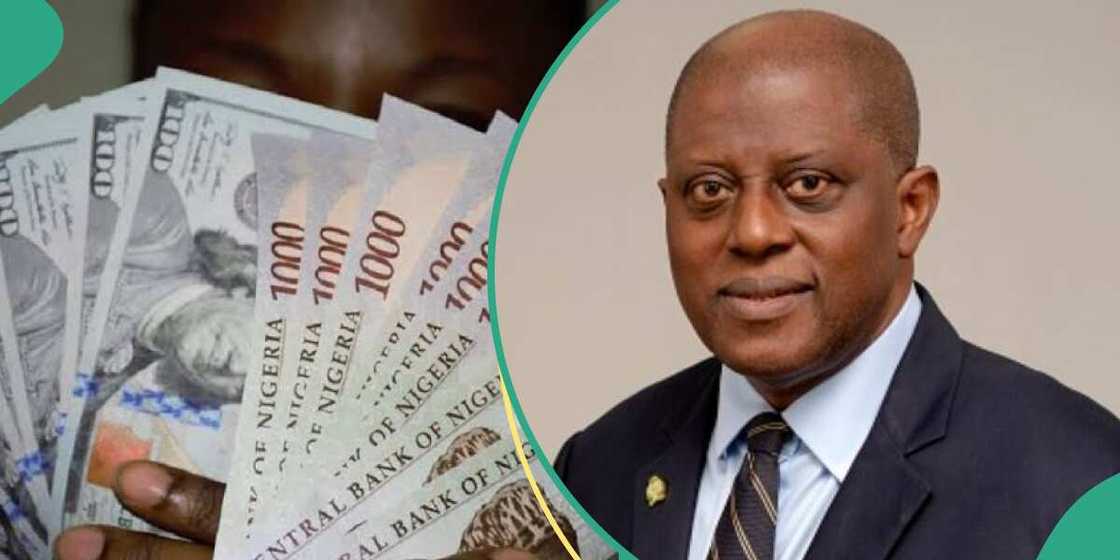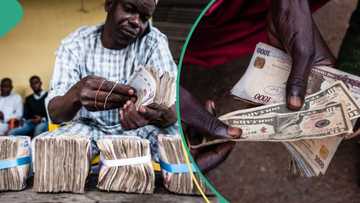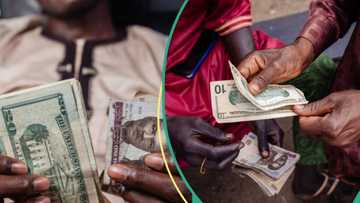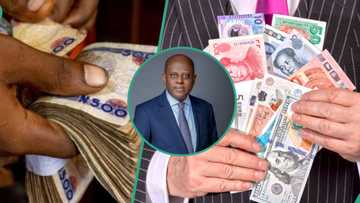Dealers, Experts Explain Reason Naira Lost Over N200/$ Despite CBN Actions, Predict Future Outcome
- BDC operators and financial experts have given reasons for the sharp decline in the naira against the dollar last week
- This occurred as the local currency dipped by 23% to close the week at N1,405/$ after it earlier appreciated to N1,140
- Experts and dealers said traders purchase dollars at a lower rate and resell them to their clients at a higher rate.
PAY ATTENTION: The 2024 Business Leaders Awards Present Entrepreneurs that Change Nigeria for the Better. Check out their Stories!
Legit.ng journalist Zainab Iwayemi has over three years of experience covering the Economy, Technology, and Capital Market.
The Central Bank of Nigeria (CBN) issuing slow forex disbursements to BDC operators has resulted in a surge in demand for dollars from banks and end users in the parallel market.
This has caused the naira to fall by 23% against the dollar last week, marking the worst weekly performance of the naira since February.

Source: Getty Images
The naira last week declined for four days in a row by N285(25%) to N1,405 per dollar on Thursday, April 25, after two months of consistent appreciation to N1,140 on Friday, April 19, from N1,820 per dollar on Wednesday, March 21.
The naira fell by N169.24 (9.9%) to N1,339.23 per dollar on Friday, April 26, last week, from N1,169.99 per dollar on Friday, April 19, in line with the similar pattern in the official market.
Why the naira declined
Investigations by Financial Vanguard showed that several reasons, including sharp practices fostered by the lower exchange rate in the parallel market, were responsible for the gradual reversal in the naira's value.
Analysts observed that the parallel market exchange rate has been below the official market exchange rate since the CBN resumed dollar sales to Bureaux De Change.

Read also
Naira bounces back, gains over N200 against dollar in black market, traders quote new exchange rate
For instance, compared to the official rate of N1,234.49 per dollar on Friday, April 19, the parallel market rate, N1,120 per dollar, was N64.5 lower.
Banks swarmed the black market, purchasing dollars at the lower rate and resold them to their clients at the higher official exchange rate in an attempt to take advantage of this disparity.
Certain forex end-users also purchased dollars on the black market, placed them in their domiciliary accounts, and then sold them to the banks at a higher official rate, imitating the actions of the banks.
Currency dealers claim that this practice led to a massive demand for dollars on the black market, which caused the naira to depreciate by 25% over four days last week.
CBN's slow response
Currency dealers also mentioned the CBN's sluggish dollar disbursement pace to BDCs.
They observed that BDCs receive dollar disbursements in small amounts; some BDCs have not received dollars for almost two weeks following naira payments to the central bank.
Confirming this to Vanguard, the President of the Association of Bureaux De Change Operators of Nigeria, Dr. Aminu Gwadabe, said,

Read also
CBN hikes Customs exchange rates for cargo clearance by 11.1% as naira crashes in all markets
“Two factors caused the depreciation of the dollar. The first was that people were buying from the open (parallel) market, depositing the dollars in their domiciliary accounts and selling in the interbank market, and this is because the parallel market rate is always lower than the interbank market rate.
“The second factor is that we have seen the resurgence of Person-to-Person, P2P, where hedging, margin trading are taking place.
“After nipping in the bud of Binance, other platforms sprang up. And you know transactions in those platforms are purely speculative. The likes of Binance can only be profitable at the expense of naira depreciation because it is a market that you buy low and sell higher.”
The investigation also showed that while FPIs and Foreign Portfolio inflows decreased, the situation was made worse by the CBN's lack of participation in the official market for a few weeks.
Nnamdi Nwizu, Co-Founder of Comercio Partners, a Lagos-based investment bank, said,
“Until Friday when they intervened, CBN had not intervened in the interbank market for weeks, and inflows were drying up.
“Also, the forex demand that waited for Naira to strengthen (appreciate) seems to be filtering through now, both local and FPIs.”

Read also
Access, UBA, GTB, other banks, traders sell dollar at new exchange rate as naira falls again
On the outlook for the naira in the coming weeks, Nnamdi said,
“A lot depends on if the CBN continues to intervene in the market to ensure they don’t lose control of the market. And also if we start to see renewed FPI flows.”
Expert speaks on solutions to Naira volatility
Legit.ng reported that Muda Yusuf, an economist, has advocated for reducing market volatility. In his view, volatility is used to encourage speculation and fuel unpredictability.
Yusuf said this while responding to the volatility in the foreign exchange market, which has caused the Nigerian naira's value to fluctuate upward and downward in relation to the US dollar.
After falling to almost 1,900 to the dollar, the naira gained strength and was recently named the world's best-performing currency, trading at about 1,100.
PAY ATTENTION: Donate to Legit Charity on Patreon. Your support matters!
Source: Legit.ng



